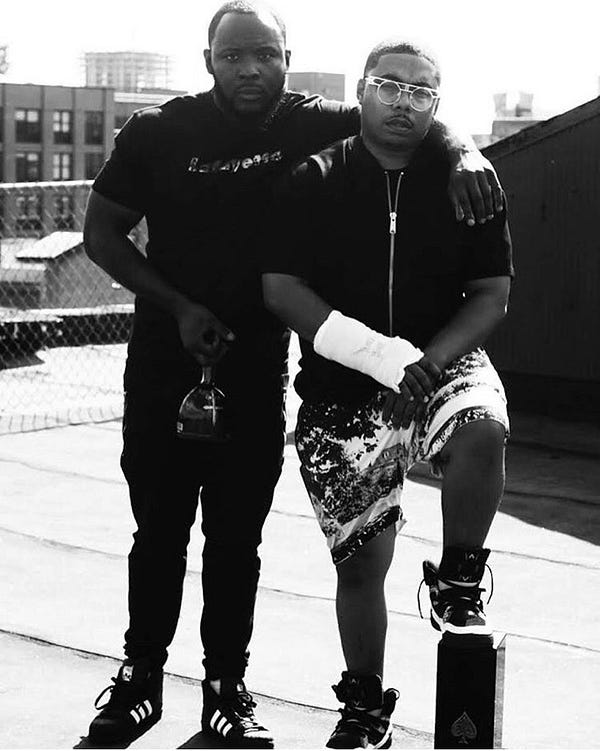[ad_2]
Rap beef has moved away from radio and onto podcasts, where the controversial host Taxstone finds himself at the center of it all. Steeped in drama and downloads, can he make the leap from the iTunes charts to something bigger?

 When Daryl Campbell was released from Rikers Island, he joined Twitter. This was in 2009, when Twitter, like Campbell, was lawless and foul; when an ex-con could reinvent himself as a wildly “problematic” jester, insulting strippers and ranking his STDs. Not content to be just one of the loudest typers in the golden age of Black Twitter, Campbell, who dubbed himself “Taxstone,” leveraged his popularity to launch a career as the most abrasive — and, quite possibly, the most important — hip-hop journalist of his generation.
When Daryl Campbell was released from Rikers Island, he joined Twitter. This was in 2009, when Twitter, like Campbell, was lawless and foul; when an ex-con could reinvent himself as a wildly “problematic” jester, insulting strippers and ranking his STDs. Not content to be just one of the loudest typers in the golden age of Black Twitter, Campbell, who dubbed himself “Taxstone,” leveraged his popularity to launch a career as the most abrasive — and, quite possibly, the most important — hip-hop journalist of his generation.
He accomplished this on the strength of Tax Season, a podcast that has amassed more than 100,000 regular listeners over 80 episodes. Two years ago, this man was just an enraged caller who promised to smack the shit out of a Twitter comedian on Real Rap Radio.
“I know exactly why I got all those motherfucking views and listens,” Tax said in the very first episode of his podcast. “It was because you niggas don’t like me.”

 Loud Speakers Network launched Tax Season in March 2015 with a debut episode in which Tax interviews his friend Diamond D. — no, not the rapper-producer, but a model and former Rikers corrections officer — about jail sex and high school brawls at McDonald’s. The iTunes Store classifies Tax Season as a comedy podcast despite its focus on hip-hop, which has sprouted a colony that’s as congested and competitive as the genre itself. Before Tax Season, there was Juan Epstein, a comedy “nerdcast” hosted by hip-hop radio personalities Peter Rosenberg and DJ Cipha Sounds; then The Combat Jack Show, a straightforward interview show on which host Reggie Ossé interviews rappers old and new; the Rap Radar podcast, an interview show hosted by veteran hip-hop journalist Elliott Wilson and his apprentice B.Dot; New Jersey rapper Joe Budden’s I’ll Name This Podcast Later, which gets dramatic and argumentative as hell; and Drink Champs, one of the leading music podcasts on iTunes, hosted by the distinguished Queens rapper N.O.R.E. (The aforementioned podcasts are all classified as music on iTunes.)
Loud Speakers Network launched Tax Season in March 2015 with a debut episode in which Tax interviews his friend Diamond D. — no, not the rapper-producer, but a model and former Rikers corrections officer — about jail sex and high school brawls at McDonald’s. The iTunes Store classifies Tax Season as a comedy podcast despite its focus on hip-hop, which has sprouted a colony that’s as congested and competitive as the genre itself. Before Tax Season, there was Juan Epstein, a comedy “nerdcast” hosted by hip-hop radio personalities Peter Rosenberg and DJ Cipha Sounds; then The Combat Jack Show, a straightforward interview show on which host Reggie Ossé interviews rappers old and new; the Rap Radar podcast, an interview show hosted by veteran hip-hop journalist Elliott Wilson and his apprentice B.Dot; New Jersey rapper Joe Budden’s I’ll Name This Podcast Later, which gets dramatic and argumentative as hell; and Drink Champs, one of the leading music podcasts on iTunes, hosted by the distinguished Queens rapper N.O.R.E. (The aforementioned podcasts are all classified as music on iTunes.)
Over the past decade, these shows have emerged as music culture completes its migration from record stores and radio to the internet. On terrestrial radio, corporate overlords such as Clear Channel have undermined the programming discretion of local, on-air talent with centralized playlists. As for those “exclusive” radio interviews with rappers, they’re all on YouTube anyway. Meanwhile, podcasting — so far a less formalized and less lucrative profession than radio broadcasting — offers hosts a greater range of expression and absolute creative control, which these prominent hip-hop podcasters seem to value the most. And more than anyone else in his lane, Taxstone is testing the boundaries. In his own podcast, he is about as vulgar, passionate, and candid as his friend N.O.R.E., but with the contemporary interests of a younger rap fan (which he is) and the probing instincts of a reporter (which he swears he’s not). He’ll dig hooks into his guests’ skin. He’ll say whatever about whomever, and he’ll provoke his interview subjects to divulge anything short of evidence that might aid an active criminal investigation.
Naturally, Taxstone has strong opinions about rappers, and he expresses these opinions rather freely. In just the past year, he’s called 2Pac and Cam’ron snitches. He’s argued that Mobb Deep’s Prodigy is a wack lyricist. He once invited Joe Budden onto Tax Season for an interview, only to berate Budden live to his face as he deflected Tax’s questions about his exploits on reality TV.
There is comedy in all of this, sure. Tax will cackle whenever the topic turns to, say, gonorrhea or his no-condoms policy. He addresses his guests, his listeners, and his followers as “beloved,” a moniker that echoes the simultaneously amiable and ominous undertones of Tax’s farewell catchphrase: “Be safe tho.” There’s tension here, too, given Taxstone’s appetite for real conflict. For a couple of years, Tax publicly antagonized the indie Brooklyn rapper Troy Ave. The subsequent beef between Tax, an insurgent hip-hop journalist, and Troy, an emergent rapper, played out last year as a series of Twitter spats, video-interview insults, live confrontations, and diss records. It was all fun and bullshit until May 25, 2016, when Troy Ave was caught on surveillance footage in a shooting at Irving Plaza. Rumor had it that Troy Ave was gunning for Tax backstage.

 Taxstone, 31, lives on Hegeman Avenue in East New York, Brooklyn, the neighborhood where he grew up, and where he fine-tuned that raspy accent. Taxstone doesn’t just talk; he growls in a manner that betrays combativeness and good humor all at once. He’s reserved, but talkative. He’s gruff, but funny. “Where we’re from, people only respect aggressiveness,” he says. “So when I speak educational things, I reach people that would never listen to somebody if they were speaking to them from the book. I’m able to translate to the people a little bit better.”
Taxstone, 31, lives on Hegeman Avenue in East New York, Brooklyn, the neighborhood where he grew up, and where he fine-tuned that raspy accent. Taxstone doesn’t just talk; he growls in a manner that betrays combativeness and good humor all at once. He’s reserved, but talkative. He’s gruff, but funny. “Where we’re from, people only respect aggressiveness,” he says. “So when I speak educational things, I reach people that would never listen to somebody if they were speaking to them from the book. I’m able to translate to the people a little bit better.”
In his teens, Taxstone developed this intuition as a child actor, auditioning for local TV roles. He once worked as stand-in for the young character G on New York Undercover, which filmed all over the city in the 1990s. Tax learned to read the casting directors. “They would be like, ‘What’s wrong, guy’? As a kid, I’m thinking, ‘What the fuck are you talking about?’ But I wasn’t angry. I just wasn’t smiling.” So Tax adapted. “I just started joking a lot and laughing so that people knew I was cool.”
The gigs were all minor, though, and life as a child actor didn’t insulate Tax from Brooklyn street life in his 20s. He fought. He shot. He robbed. He once took a bullet in his left eye, where he’s gone blind. He says he was briefly a pimp but couldn’t live with the manipulation it required. In his early 20s, he got sent up on robbery and gun possession charges, which landed him in jail from 2006 through 2009. He’s faced other criminal charges since then, including weapons, assault, and intimidation charges stemming from a January 2012 altercation at the now-shuttered Hype Lounge in Manhattan. Altogether, Taxstone has spent about seven years in jail.
The launch of Tax Season, marking Tax’s transition back into entertainment, has provided him with a sort of mental-health break. “It’s actually a therapeutic thing for me to just speak, and that’s [also] why I tweet so much,” he says. (As in, more than 100 tweets on an average day, plus a few dozen retweets.) Taxstone describes his podcast as “therapy.”
In some cases, this therapy benefits host and guest alike. On September 23, Meek Mill’s friend Teefy Bey reportedly sucker punched Beanie Sigel at the Philadelphia stop of the ongoing Bad Boy Family Reunion Tour. When smartphone footage of the offstage altercation at Wells Fargo Center surfaced in social media feeds and online news reports, Sigel, a previous Tax Season guest, called Taxstone to schedule an interview.
Five days later, Sigel would make his second appearance on Tax Season to expose Meek Mill’s insecurities in dealing with Game and Drake. The episode is a tense, thrilling interview that’s remarkable not only for the clarity of Sigel’s exposé but also because Tax asks only two questions in the course of a 90-minute evisceration. Whereas radio jocks, such as Power 105’s Charlamagne Tha God or Hot 97’s Ebro, or rival podcasters might’ve interrupted Sigel to regain control of the conversation, Tax lets Sigel dominate; he trusts his famously pugnacious and eloquent guest to lead and captivate. In turn, Sigel trusts Taxstone: “You ain’t call me,” he clarifies for Taxstone’s listeners at the top of the episode. “I called you.” Sigel’s spiteful review of Meek Mill’s text messages is a definitive moment in Tax Season’s year-and-a-half run. And it speaks to Taxstone’s strengths and advantages as a professional interviewer who’s still rooted firmly in street-level perspective.
I ask Tax why Meek Mill has not appeared on Tax Season to tell his side. “I didn’t want to bring him on in the midst of the conflict because my troops really feel that he doesn’t know how to articulate himself as good as Beanie Sigel,” he says. “That would have hurt him.” And so Meek Mill, failing the sense to explain himself beyond scrimmage diss records and social media, has ceded control of his own story to a loud Brooklyn nigga with a podcast. The game done changed.

 In August, Tax interviewed Star, the disgruntled ex-radio hip-hop shock jock; their conversation marked a changing of the guard. Star, who made his name on New York radio in the ’00s, patented the brand of shit-kicking and malice that made way for personalities like Charlamagne and, now, Taxstone. Star’s prominence on the airwaves ended in 2006, when he was fired after repeatedly threatening, on-air, to sexually assault the young daughter of rival DJ Envy. Tax is alienated from radio for his own reasons; he believes Hot 97 isn’t really putting on for the hometown rap scene. This is a key point in the civil war that’s broken out among NYC hip-hop’s pundit class. “When their ratings start falling, they start running back to the kids,” Tax says about the station.
In August, Tax interviewed Star, the disgruntled ex-radio hip-hop shock jock; their conversation marked a changing of the guard. Star, who made his name on New York radio in the ’00s, patented the brand of shit-kicking and malice that made way for personalities like Charlamagne and, now, Taxstone. Star’s prominence on the airwaves ended in 2006, when he was fired after repeatedly threatening, on-air, to sexually assault the young daughter of rival DJ Envy. Tax is alienated from radio for his own reasons; he believes Hot 97 isn’t really putting on for the hometown rap scene. This is a key point in the civil war that’s broken out among NYC hip-hop’s pundit class. “When their ratings start falling, they start running back to the kids,” Tax says about the station.
Star smiles. “They’re a nonfactor,” he says.
But podcasts, now a plentiful consumer alternative to FM playlists and drivetime interviews, aren’t a totally proven successor to the radio business, since advertisers aren’t totally sure how to measure audience engagement within the medium. Even so, Taxstone has upset the old guard of radio programmers and personalities.

Taxstone and Manolo Rose (Courtesy of Taxstone)
Influential hip-hop figures have certainly taken notice. From Beans to Memphis Bleek, the old Roc-A-Fella Records family has been especially instrumental in Taxstone’s come-up. Through Bleek, Taxstone met Jay Z in December 2015. “He just wanted to meet me,” Tax says. “We spoke for like three hours. About Brooklyn and the music industry. We spoke about a lot of shit.” After word about his sit-down with Jay Z got out via social media and hip-hop blogs, Tax started taking calls. He says he’s met with Vice, BET, VH1, and MTV; in fact, Charlamagne recruited Tax as a recurring guest on his MTV2 panel show Uncommon Sense, where Tax was briefly suspended earlier this year after Ebro flagged disrespectful comments that Tax tweeted about his wife to Viacom executives. Tax took a meeting with Russell Simmons, who then sat for an interview with him in January. Jay’s keys opened doors beyond podcasting and commentary; Bleek has brokered a couple of recent contracts with Tax, for the rappers Manolo Rose and Casanova. “He’s a good businessman,” Bleek says. “He’s up before the birds chirp. Tweeting beef before the sun up. He don’t eat no oatmeal or nothing.”
Taxstone manages Rose, who signed to Roc Nation through Bleek’s new record label, Warehouse Music Group, in July. “Without Taxstone, a lot of things probably wouldn’t have happened for myself,” Rose says. “Taxstone kinda put it in hyperdrive for me. I owe a great deal to the man.”
Even as his sensational interview with Beanie Sigel and his feud with Troy Ave have splashed his name all over the internet, Taxstone hasn’t yet peaked. He’s met with Jay Z, but he hasn’t formally interviewed the reformed Brooklyn gangster, who spent a couple of decades of his early career shaking the habits that helped him earn his criminal record. Tax tells me he grew up loving Hov as if the rapper were a distant father. In our time together, however, Taxstone repeatedly cites Styles P as his definitive wisdom: “I want the finer things, and I hope you understanding me / Sitting at the table, planning; plug the fan in / Let the sweat dry off, and then grab your cannon.” See, it’s that last bit of Styles’s advice that’ll imperil an otherwise promising come-up from street life. Leave the gun, Tax. Smile, beloved.


Let's block ads! (Why?)
[ad_1]
Source link
No comments:
Post a Comment